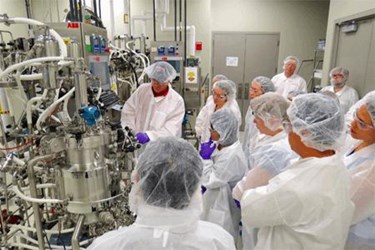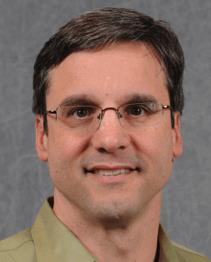Biomanufacturing As Seen From A North Carolina Campus

By Louis Garguilo, Chief Editor, Outsourced Pharma

Gary Gilleskie graduated with a Ph.D. in chemical engineering, immediately went to work at a contract development and manufacturing organization, and became senior director for downstream manufacturing and process development.
Now he’s back on campus to ensure part of his history is not repeated: obtaining that first job in biomanufacturing without a solid background in the industry.
Gilleskie is director of operations for North Carolina State University’s Golden LEAF Biomanufacturing Training and Education Center (BTEC). He’s dedicated to training your engineers, and growing the talent pool of skilled candidates for your biomanufacturing jobs. He rolls up his sleeves to teach some of the biomanufacturing classes; he’s especially proud of the cGMP facilities and equipment at the center.
 Companies like Biogen are appreciative. Chad Cooper, director of manufacturing performance development at Biogen's Research Triangle Park location says, "We’ve benefited from a reliable flow of well-trained biomanufacturing professionals from BTEC, and utilize customized professional training courses to provide ongoing employee development.”
Companies like Biogen are appreciative. Chad Cooper, director of manufacturing performance development at Biogen's Research Triangle Park location says, "We’ve benefited from a reliable flow of well-trained biomanufacturing professionals from BTEC, and utilize customized professional training courses to provide ongoing employee development.”
All good stuff for sure.
Yet what we’re mostly interested in for this article is the reverse knowledge flow: What is Biogen and others teaching the training center about current trends in biomanufacturing facilities?
One answer has to do with creating that new history for recruits.
Hit The Ground Running
To answer our question, Gilleskie starts from the overall raison d'état of his and other biomanufacturing training centers.
“The real reason for our existence and growth is that companies today absolutely need qualified people with skill sets that allow them to hit the ground running,” he says. In other words – unlike when he was entering the industry – the days of relying on on-the-job training are numbered.
Moreover, the trained-candidate search today has no off button.
“There’s always been a close link between BTEC and the biopharmaceutical industry,” explains Gilleskie. “The local industry made the case for establishing BTEC in the first place. Studies were done locally to figure out what was needed from a workforce standpoint. What we learned most of all is that the industry is always looking for that qualified workforce.”
“As for specific trends,” says Gilleskie, considering what he hears from both biomanufacturers and CMOs, “certainly single-use processing is big. We’re integrating these training courses, and we invite vendors to help put the courses on. They actually provide us the latest single-use technologies circulating around the industry.”
Next on Gilleskie’s list of specifics is continuous manufacturing. No surprise here. “Most of our processes in biopharmaceutical manufacturing are still batch based, but there’s a discernable push to go continuous. What’s important, though, is to provide a full understanding of all the advantages that a continuous process might offer.”
And, adds Gilleskie, changes beget changes. “For example, in addition to going from stainless steel to single-use equipment on the processing side, we’re also seeing changes in analytical technology. The industry is not just about protein therapeutics or monoclonal antibodies anymore. There’s a real push in the areas of cell and gene therapies. With all these new technologies coming online, there really is a need to continuously hire qualified people ready to get going.”
Follow In The Professor’s Footsteps (To A CMO)?
Particularly given his own career experience, Gilleskie ensures that students also understand the outsourcing dynamic at play in the biopharma industry, and the nature of opportunities at CMOs. Along with his former employer, FUJIFILM Diosynth, CMO KBI Biopharma is also a member of the BTEC advisory board.
As I’ve opined in previous articles, biopharma wins when a new workforce candidate joins its ranks directly, or joins one of their CMOs. The point is to expand the pool of trained workers throughout the industry.
“I talk to my students about the differences between what a contract manufacturing organization would do versus what a company manufacturing its own products might,” says Gilleskie.
Something he always mentions: A CMO environment is excellent for learning, because of the various projects and products coming into the organization from different sponsors. CMO workers find themselves “perpetually challenged, both technically and strategically.”
“Working at a CMO, you really get the lay of the land,” Gilleskie says. “However, I’m always sure to stress that it’s extremely hard work at a CMO. You have a lot coming at you, and the regulatory and customer demands are high.”
Your Reputation – Deserved Or Not – Precedes You
Perhaps like many readers, I’ve grown concerned about what young men and women arrive on campus thinking of the biotechnology or pharmaceutical industry. Let’s face it: There’s a lot of criticism – mostly undeserved, I’d add – in the media and political arenas. So I was pleasantly surprised to learn in our first article of the relatively large numbers of students enrolled in BTEC programs and courses. (And by the way, 35 percent of those students are now women.)
“Future scientists and engineers may have some preconceptions of the industry,” advises Gilleskie. “But they are attracted to the hands on and practical engineering experience. Once they’ve had the opportunity to work with the equipment, and within a real cGMP environment, they start to understand biomanufacturing from a skill and regulatory standpoint. I think they grow in appreciation of the challenges for the industry. They begin to see how involved the process of making a drug is, and I think they begin to see some of the reasons why drugs are priced as they are. So that’s just part of their education, too.”
I’m just thinking aloud here – but maybe we could ask Gilleskie to design a few courses for some members of the mass media, and certain politicians.
But for now, we’re happy for the industry – and patients around the world – benefiting from more highly trained and knowledgeable workers at biomanufacturing facilities. Gilleskie’s experience didn’t turn out too bad at all, but he’d be the first to admit there’s always room for more learning.
